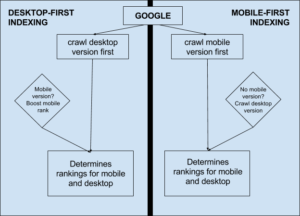What is Mobile-First Indexing and Why Should You Care?
Over the past few months, Google has begun to roll out an element of their search that has been a hot topic of discussion: mobile-first indexing. We know that mobile usage is having an effect on every business online, and we know that more users every day are picking up a phone or tablet to find their answers. But what does a shift to mobile-first indexing mean for your online presence, and what is mobile-first indexing anyways?
In today’s search universe, more than half of all search traffic comes from a mobile device. Mobile search overtook desktop search in volume back in 2014, and the mobile universe has not looked back. Think the next generation isn’t going to continue the trend? Google has an entire look into Generation Z and where it sees the biggest market shifts moving forward. They are getting smartphones earlier, using them more, and want you to come to them, not the other way around.
So now what?
What is mobile-first indexing?
According to Google, “Mobile-first indexing means that we’ll use the mobile version of the page for indexing and ranking, to better help our – primarily mobile – users find what they’re looking for.” Sure, nearly every website platform that exists today provides businesses with a responsive version of the site, which qualifies as a mobile version. But moving forward, that mobile version could become the primary page that is indexed and ranks, making the most beautifully, well-crafted desktop design move to a secondary focus for Google’s search algorithm.
What impact will this have on your website?
In the immediate, the mobile-first indexing is rolling out only to a handful of websites. Google is testing the effect that this indexation will have prior to making it widespread, but it is going to be coming for all sites. This is not an indication that you will need to redesign your site, but you should begin to look at the site primarily from the mobile point of view. Was it designed with mobile in mind? Does all of the functionality carry over to mobile? How do your users interact with it on mobile? These are just a few of the questions you’ll want to answer.
Overall, the impact on your website will fluctuate. If you have a mobile-friendly site that exists because of the platform you used, you will likely see some negative effects on your organic value. If you designed with mobile-first intent, your site should see positive gains in organic.
What do you do right now?
Step one: don’t panic. Google is not going to be penalizing sites for having a desktop focus directly, and this is still being rolled out fairly slowly. All users will be notified via their Search Console (if you don’t have your Search Console set up, you should do that) when the rollout for your site has completed. As of now, there is no date as to when this rollout will be completed for all sites.
Step two: start making some changes. Although it will not hurt you today, you should begin to prepare for tomorrow. Talk with your team about mobile-first indexing, what you can be doing differently, and begin to focus on your mobile users. Write content that is focused on mobile search (i.e. question-based, terms using “near me,” etc…) and design in a way that will display best on mobile devices.
This will be a big shift in the way that Google operates, and the other major search engines (Bing, Yahoo) will surely follow suit. So begin planning now for the future of search, because your users are out there waiting on mobile!


 Combine smarts speakers with mobile voice technology – your old friends, Google Assistant, Siri, Cortana, and voice search have become a dominating force for marketers and SEO. In 2016, 1 in 5 mobile searches were conducted via voice search.
Combine smarts speakers with mobile voice technology – your old friends, Google Assistant, Siri, Cortana, and voice search have become a dominating force for marketers and SEO. In 2016, 1 in 5 mobile searches were conducted via voice search.